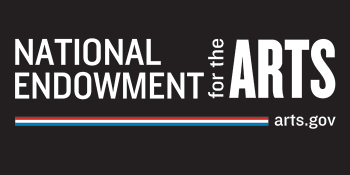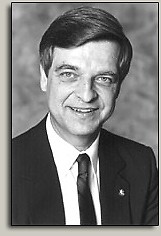Many modern-day Evangelicals believe integrating Christian faith with political practice represents a clear battle between good and evil. But that’s not how one of earliest and most popular Evangelical politicians from Grand Rapids, the late Paul B. Henry, viewed it.
Henry, a former professor, U.S. Congressman and state legislator who died in office 16 years ago, believed that when one follows their faith, finding resolutions to controversial political issues can be more complex and difficult.
This observation was among many shared by Calvin College Professor Corwin Smidt when he reflected Thursday, Sept. 10 on Henry’s life, thought and public service. His presentation at the Gerald R. Ford Presidential Museum was the first of eight programs sponsored by the Grand Rapids Historical Society.
Smidt said he consistently found a theme in Henry’s work and writings that urged a “more rigorous engagement” among Christians to integrate their faith with political practice. Henry believed that political engagement required humility, pragmatism, honesty, charity and ethics, he said. “Politics is not a battle between good and evil, but a compromise,” Henry believed. “Non-involvement could become a sin of omission.”
Henry taught political science at Calvin College from 1970 to 1978 before he successfully ran on the Republican ticket to be elected to the Michigan House of Representatives and, later, State Senate. He was elected to the U.S. House of Representatives in 1984 where his political career further blossomed, earning him the title of “Rising Star” by the National Journal in 1990. New York Times Columnist David Broder described Henry as “one politician who lived up to the highest standards of public service.”
But his career and life were cut short. In October 1992, two weeks before Election Day, he was diagnosed with a brain tumor. He underwent surgery a few days before re-elected to his fifth term in Congress. He was able to attend his swearing-in ceremonies. But then he began to decline again before dying in July 1993 at age 51.
Henry’s involvement in politics was part of an emerging movement among Christian Evangelicals. In the 1970s, the evangelical movement in the United States was just “coming out” by becoming more active in politics. In his 1974 book, “Politics for Evangelicals,” Henry outlined a blueprint to his own involvement in some of the most controversial political issues facing Americans at that time: racism, poverty and the Vietnam War.
Calvin College established the Paul B. Henry Institute for the Study of Christianity and Politics in 1997 to continue the work of integrating Christian faith and politics advanced by its namesake. Smidt serves as its executive director and holds the Paul Henry Chair in Christianity and Politics at Calvin.
Smidt summed up Henry’s political principles.
- The need for Christian humility. “All have sinned so no one can presume infallibility,” Smidt said. “Henry was mindful of civility and the need for more moral humility and a little less spiritual pride.”
- The need for a mature Christian social and political ethic was a second principle advanced by Henry. Solely having “faith in Christ is not a sufficient panacea for political problems,” despite this common belief among many Protestant Evangelicals, Henry believed.
- The need for Christian political engagement. Henry believed that “Christians are not to withdraw from the world but to engage and transform the world,” said Smidt. The fourth principle, the prudence of working within our two-party system,” was important because Henry felt one could accomplish things while working within the constraints of the American political system.
Finally, the last principles were political pragmatism and the need to practice political honesty and charity.
Smidt said the convergence of religious faith and political practice is increasing in today’s world with the rise of religiously-based political movements in the United States, the growing legal controversy on the proper role of church and state, and the religious basis for many international political regimes and movements.
His presentation stirred up several comments from the audience, including some from Henry’s widow, Karen, who recalled the anguish Americans experience during that time over the Vietnam War, a war opposed by Henry. She also remembered Henry’s opposition to term limits because he felt the legislators had so much to learn before they could make good decisions on the complex and numerous issues facing them.
Others remarked on today’s state of American politics in which open and honest discussions, civility and compromise are often abandoned for the sake of advancing party lines. It was noted, ironically, that these admirable traits were often used to describe former President Gerald Ford, the namesake of the building where the presentation was held.
The Rapidian, a program of the 501(c)3 nonprofit Community Media Center, relies on the community’s support to help cover the cost of training reporters and publishing content.
We need your help.
If each of our readers and content creators who values this community platform help support its creation and maintenance, The Rapidian can continue to educate and facilitate a conversation around issues for years to come.
Please support The Rapidian and make a contribution today.


Comments
Thanks to The Rapidian for allowing Non-Profits this free outlet to get out our news! This on-line publication is a welcome and much-needed service. At last, those organizations such as the GR Historical Society, can get out the news about their programs and services.
Alll are welcome to the next GRHS program open to the public at 7 p.m., Thursday, Oct. 8 on "They All Fall Down: Michigan's Banking Collapse of 1933" by GVSU History Professor Matthew L. Daley. It will be held at the Gerald R. Ford Presidential Museum, 303 Pearl St. NW, GR. The program is free to everyone. Parking is free, too!